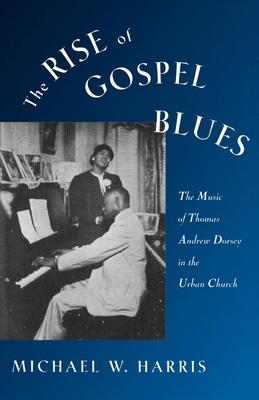After a nervous breakdown and a subsequent religious conversion in 1928. Dorsey began to write gospel songs with blues accompaniments. His introduction of these "goals" into Chicago's Afro-Baptist churches during the 1930s stirred clashes between recently arrived southern migrants who felt comforted by the new spirituals and old-line members who dismissed the songs as sacrilegious echoes of the slave past. After years of writing and publishing hudnreds of "songs with a message"-- such as "Take My Hand", "Precious Lord", and "There Will Be Peace in the Valley"-- and training gospel singers such as Mahalia Jackson, Dorsey had earned the title of "father" of gospel blues by the early 1940s. Delving into the life of the most prominent person in the advent of the gospel song movement. Harris illuminates not only the evolution of this popular musical form, but also the thought and social forces that forged the culture in which this music was shaped.

The Rise of Gospel Blues: The Music of Thomas Andrew Dorsey in the Urban Church
After a nervous breakdown and a subsequent religious conversion in 1928. Dorsey began to write gospel songs with blues accompaniments. His introduction of these "goals" into Chicago's Afro-Baptist churches during the 1930s stirred clashes between recently arrived southern migrants who felt comforted by the new spirituals and old-line members who dismissed the songs as sacrilegious echoes of the slave past. After years of writing and publishing hudnreds of "songs with a message"-- such as "Take My Hand", "Precious Lord", and "There Will Be Peace in the Valley"-- and training gospel singers such as Mahalia Jackson, Dorsey had earned the title of "father" of gospel blues by the early 1940s. Delving into the life of the most prominent person in the advent of the gospel song movement. Harris illuminates not only the evolution of this popular musical form, but also the thought and social forces that forged the culture in which this music was shaped.